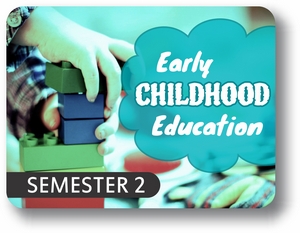
Early Childhood Education Semester 2 Developing Early Learners
Building on the previous prerequisite course, discover the joys of providing exceptional childcare and helping to develop future generations. Learn the importance of play and use it to build engaging educational activities that build literacy and math skills through each stage of childhood and special need. Use this knowledge to develop your professional skills well suited to a career in childcare!
Syllabus:
Unit 1: Play: A Child’s Work
Early childcare workers and caregivers serve a key role in facilitating play for young children. From birth to age six, play is essential for the child’s growth and development, providing a vast array of learning opportunities. Understanding the value of play, its role in the childcare home or center, and how adults can encourage and support children’s play is an essential part of understanding early childhood development and early childhood education.
What will you learn in this unit?
Unit 2: Guidance and Discipline
Creating a positive, loving, and enriching environment for children requires not only an understanding of child development, nutrition, and safety but also the ability to discipline and guide children. Maintaining a well-controlled classroom and teaching children appropriate behavior are essential responsibilities of any childcare provider. With additional knowledge about discipline and guidance, you will be prepared to work together with children, parents, and coworkers to create a positive and nurturing space.
What will you learn in this unit?
Unit 3: Communication, Observation and Recording
While caring for children is the childcare provider’s primary responsibility, care providers also must communicate with parents, observe children, and record those observations. By maintaining open and positive communication with parents, you can work as a team, acting in the best interest of the children in your care. Observation and recording are two essential tools that can provide parents with information about their children and provide care providers with additional insights about both individual children and the functions of the classroom or daycare home.
What will you learn in this unit?
Unit 4: Early Literacy Skills
Building language and literacy skills is essential in early childhood. Childcare providers can help children develop a broad vocabulary, language skills, and letter recognition in preparation for kindergarten. While childcare facilities may opt for a more or less academic perspective, creating a rich environment with ample access to language and books will help children be ready to learn to read.
What will you learn in this unit?
Unit 5: Early Math Skills
Early math skills build upon and are informed by early literacy skills! Think about it—we use words to describe mathematical patterns and phenomena like “more” and “less,” so the more a child’s verbal ability grows, the more they can manipulate complex mathematical concepts. Childcare providers can encourage children to develop early pre-math skills through play and everyday interactions.
What will you learn in this unit?
Unit 6: Planning Appropriate Curriculum and Activities
Children need the opportunity to engage in self-directed and teacher-directed activities each day. The good news is that there are almost endless curriculum planning resources available to help you develop engaging and enriching lessons for your students. We’ll go over some of the most common and effective curriculum models and some fun ideas for children of all ages in the extracurricular subjects of physical activity, outdoor play, and arts and music.
What will you learn in this unit?
Unit 7: Using Technology in Early Childhood Education
So much of cognitive and social development occurs during the first few years of life. But how does technology (and, more specifically, screen use) impact that growth? We all likely have memories of favorite childhood TV shows or movies that taught us letters, shapes, or how to be a good friend, so we know that technology can be a useful tool in building important early childhood skills. We’ll explore appropriate use of technology in the early childhood setting and experiment with some of the newest trends and tools the media world has to offer young learners.
What will you learn in this unit?
Unit 8: Personal Goals and Development
The study of early childhood education and child development may provide the basis for a career in child care, early childhood education, or other fields strongly related to child care and children’s welfare and well-being. During this course, you may have discovered subjects of strong personal interest and feel drawn to a particular aspect of early childhood education, from nutrition to children with special needs. Regardless of your personal interests, if you opt to pursue a career working with children, you need to consider your educational goals, your personal dreams, and the best way to build a successful and rewarding career.
What will you learn in this unit?
Explain how to care for yourself while carin
